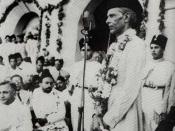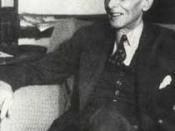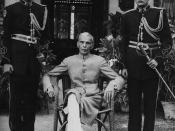�PAGE �2� [Type text] [Type text] [Type text] Gill � PAGE �10�
The province of Kashmir has remained a point of contention between India and Pakistan resulting in mounting antagonism in the region. The conflict ignited when tensions heightened between the Indian National Congress (INC), which represented the majority Hindu population, and the All-India Muslim League (AIML), which argued for a separate homeland from Hindu Indians.� The conflict further escalated when Muslim opinion was not equally regarded by the British Raj as Hindu opinion was, and in 1947 when the British annihilated its Indian empire.� The conflict continues to affect Pakistan and India today at the interstate level and the international level. Although there have been and continue to be occasional peace initiatives by international actors to bring the conflict to a halt�, the two nations remain hostile towards each other. There are numerous causes of the conflict between Pakistan and India including both nations' identification with religious nationalism, the Indo-Pakistani Wars caused by the long-running conflict over the state of Jammu and Kashmir, and the Cold War.
The conflict is becoming more alarming due to the fact that both India and Pakistan possess nuclear weapons that have the potential to trigger a full-scale nuclear war between the countries.�
Samuel P. Huntington's "The Clash of Civilizations?" presents the idea that states' cultural and religious identities will be the source of conflict in the post-Cold War era�, and when examining the conflict between India and Pakistan, it is appears that this theory accurately explains the complexities surrounding the struggle. In fact, Huntington further explains that the Islamic and Hindu civilizations of India and Pakistan are perfect examples of how ideological conflicts have been replaced by religious confrontations.� However, these religious differences did not develop after the Cold War; rather they are...


